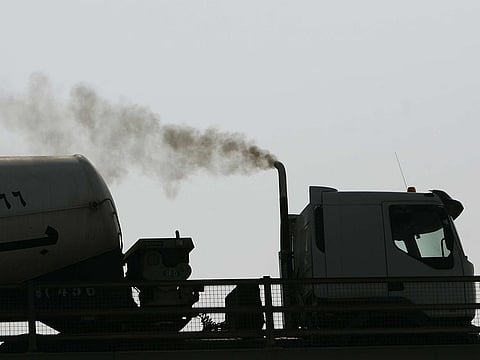How air pollution is fuelling the climate crisis
Masdar and its green principles need to be emulated to safeguard the UAE’s environment

While it is heartening to see a broader consensus at COP28 in Dubai to phase out fossil fuels, the effects of carbon emissions have gone too far, impacting the quality of life. There is an irrefutable link between air pollution and the climate crisis.
In the UAE, the connection between air pollution and climate change is supported by the country’s decision to join the Climate and Clean Air Coalition (CCAC) in 2019 and the pledge to reduce Short-lived Climate Pollution (SLCP) emissions.
This highlights the seriousness to tackle air pollution as well as the evidence behind its contribution to climate change in the UAE. Air quality measurements, the process of understanding the impact of air pollution on the environment, has been an environmental priority for the UAE since 2013 when the UAE Vision 2021 plan was first launched.
The daily commute and the resulting traffic build-up are responsible for creating a range of harmful substances in the atmosphere including nitrogen oxide, carbon monoxide, and other gases such as carbon dioxide.
Negative impact on human health
While carbon monoxide does not directly cause climate change, high levels of carbon monoxide are indirectly linked to the climate crisis. The presence of carbon monoxide leads to an abundance of GHGs such as methane and carbon dioxide in the atmosphere which exacerbates climate change.
Nevertheless, the UAE government has a strong carbon agenda. In September 2022, the UAE updated its second National Development Council (NDC), raising the emission reduction target to 31 per cent, with key contributions from electricity generation, industry, transport, carbon capture, utilisation, storage and waste management.
This can be demonstrated through the UAE’s transport policy, and how it has increasingly adapted to reduce emissions. In 2013, the UAE passed a law that banned diesel fuels exceeding sulphur content of 10 parts per million (ppm). Two years later, the Dubai Green Mobility Initiative was launched with the aim to promote the purchase of electric/hybrid vehicles with lower carbon emissions.
Professor Diana Francis, head of environmental and geosciences lab at Khalifa University, notes the continual increase in methane emissions, particularly near salt and mud flats, both of which are important sources of natural gas and are linked to natural gas extraction.
Professor Diana Francis has explored the impact of air pollution in fuelling the climate crisis and its effects on the environment. SO2 (Sulphur Dioxide) emissions are caused by the burning fossil fuels such as oil and gas, as well as heavy industries in the UAE. She explains that Particulate Matter (PMs) and SO2 “have a very negative impact on human health and other negative effects on ecosystems”.
Reducing methane emissions
It is established that air pollution is fuelling climate change and is affecting the UAE environment due to SO2 emissions released by natural gas extraction. Furthermore, SO2, emitted by the burning of fossil fuels is damaging the UAE’s environment by harming trees and local plants, reducing plant growth, and damaging sensitive local ecosystems especially mangrove forests.
Greenpeace also reports that over 97% of cities do not meet international air quality guidelines as per IQ Air’s 2021 World Air Quality Report. Moreover, many cities around the world suffer from a lack of available air quality data.
However, the UAE has kept air quality records since the 1990s and is now acting strategically on the issue of air pollution. Through its commitment to reducing methane emissions, the UAE government is working towards limiting global warming to just over 0.2 degrees Celsius by 2050 and reaping environmental benefits such an improved public health and agricultural productivity.
Role of Etihad rail network
The UAE government is actively considering initiatives to mitigate the impacts of air pollution on climate change and the environment. Professor Diana Francis highlights the role of the Etihad rail network which will encourage UAE commuters to opt for environmentally friendly transport and will help reduce emissions from tracks and vehicles.
Thus, limiting the levels of GHGs in the atmosphere and perhaps slowing the rate of climate change and reducing its impact on the environment. Also, some efforts to make the processes in heavy industries cleaner are being considered including the introduction of the use of filters directly in the production process to avoid the escape of pollutants into the atmosphere.
The support for mangrove conservation initiatives is crucial, as well as the regulation of emissions from aeroplanes, cruise ships in UAE waters and public transport as well.
Cutting CO2 emissions
The UAE’s Masdar initiative in Abu Dhabi is the country’s first carbon neutral city. Masdar, an eco-friendly initiative launched by the Abu Dhabi government, intends to create a carbon-free community with leading office and research facilities on green construction, biofuels, sustainable transport among other areas.
In the long-term, the Masdar initiative will help reduce air pollution levels in the UAE and reduce the impact of climate change by moving the UAE towards a carbon-neutral economy and society and divesting from fossil fuels. By contributing to, “a multi-billion-dollar expansion of the Abu Dhabi non-oil economy”, the Masdar initiative will help the UAE reduce to invest in green energy and significantly cut CO2 emissions, thus mitigating climate change.
Increased awareness about the causes and consequences of air pollution, corporate social responsibility, and sustainability are important in the transition to green energy and transport. Masdar and its green principles need to be emulated throughout for cleaner skies and to safeguard the UAE’s environment.
Nibras Malik is an environmental journalist


